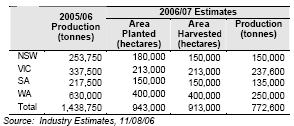Australia
September 18, 2006
Australian Oilseeds
Federation - Crop Report September 2006 (excerpts)
 Canola
2006/07 Canola
2006/07
The canola crop estimates have
been revised down by over 25% and the crop still hangs in the
balance needing more rain.
In New South Wales,
there was some rain in the north last week and 15-20mm in places
of south west slopes and Murray River. Aphids are emerging as a
problem in the north. The Central west continued to have no
subsoil moisture and some crops are likely to be grazed or cut
for hay. Drought conditions continue to prevail in the south.
Some crops are in full flower, but there is little bulk of
plants. Farmers have tended to hold back on fertiliser
application given the late break and low rainfall and this may
affect oil contents. Aphids and Diamond Back Moth are present in
crops. The figures for NSW have been revised down for both area
and yield, and if there is little or no rain in the next week or
10 days, production estimates are likely to be reduced
significantly.
Victoria received life
saving rain over the past week or so. More rain over the next
month is needed to secure the quoted yields, but most of the
Victorian crop is now likely to be harvested. The western
districts will again be the key region for production and
currently the crops look good. However, there is little subsoil
moisture and the crops will need further rain to reach their
potential. At this stage, area has been left unchanged and
yields revised down a little.
Estimates for South
Australia have been revised down significantly, with the
state having missed the recent rain
event. The areas that were looking good such as the mid north
and parts of Eyre Peninsula have come back and the areas like
the South East that missed the early rain are in poor condition.
Along with the dry conditions, there have been very warm
temperatures. There could be some further downside for the
state.
Warm weather has affected crops
in Western Australia, but growth in healthy crops across
the state, particularly in the upper Great Southern, has picked
up with recent rainfall. Aphids are reported to be in damaging
numbers on canola crops from the Great Southern to the lower
northern region closer to Perth. Estimates of 30% of flowering
spikes are infested with aphid colonies on some crops and
spraying has occurred. There remains concern about locusts
building up, but no large numbers have been reported as yet.
Budworm has been observed up North and some Diamond Back Moth
has been reported down south. The biggest limiter to total grain
production now is the crops that didn’t come up or were not put
in because of the late start.
Watch the canola crop progress at
the Virtual Canola Crop site:
http://www.australianoilseeds.com/info/virtual_canola_crop
Sunflower 2006/07
Our first estimates for the
sunflower crop will be in the October edition, although planting
of the early crop is
underway. In the northern New South Wales region, the early crop
is essentially planted, with growth stage ranging from just
shooting to 2 leaves. 10-40mm of rain has been received in the
last 10 days, which should result in good germination and
establishment of crops. The area is back on last year due to
lack of suitable fallow available, good prices for competitive
crops such as sorghum and a poor finish to the last year’s crop
which resulted in poor returns after an excellent start to the
crop. In the Liverpool Plains planting is just about to start,
with areas are well down on last season. Conditions are very dry
and most potential growers need rain to start sowing. Similarly
on the Downs, growers are waiting for rain.
|